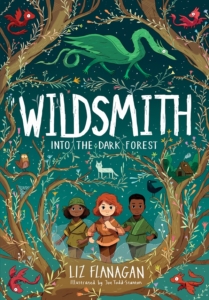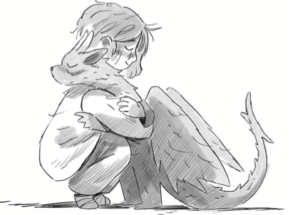
A Q&A Interview with Liz Flanagan
Liz Flanagan’s books include the fantasy series, Legends of the Sky and contemporary YA thriller Eden Summer. Her new series, Wildsmith, is for younger readers, a highly enjoyable tale of bravery, friendship, dragons and a little bit of magic. She answers our questions about the book, young readers and dragons here.
Introduce us please to Rowan, the central character in Wildsmith.
 When war breaks out, Rowan has to leave her carefree life, her home, friends and beloved father. She and her mum journey to the safety of the Dark Forest and stay with the mysterious grandfather she never even knew she had, who turns out to be a wildsmith – a person with magic powers of healing animals and talking to them. Rowan is brave, curious and a bit stubborn, someone who loves animals and climbing and being outside. She saves some baby dragons from poachers, and as the clues mount up, Rowan starts to wonder if she might also be a wildsmith, like Grandpa. When danger threatens she must call on her newfound powers to save the creatures of the Dark Forest.
When war breaks out, Rowan has to leave her carefree life, her home, friends and beloved father. She and her mum journey to the safety of the Dark Forest and stay with the mysterious grandfather she never even knew she had, who turns out to be a wildsmith – a person with magic powers of healing animals and talking to them. Rowan is brave, curious and a bit stubborn, someone who loves animals and climbing and being outside. She saves some baby dragons from poachers, and as the clues mount up, Rowan starts to wonder if she might also be a wildsmith, like Grandpa. When danger threatens she must call on her newfound powers to save the creatures of the Dark Forest.
You’ve said that the book was written during summer 2020, ie mid Pandemic. How did that affect the book and your writing generally?
In those months, walking out into the woods every single day became a real lifeline. It made me realise how much I value being outside in wild places for my wellbeing and mental health. It’s perhaps no surprise then that my next story was set in a magical forest, and writing this became a wonderful escape for me. I had also been fostering animals, just like Rowan does in this series. In lockdown we were looking after a young cat and her two kittens, which gave us a focus and a job when most other things were cancelled! The clutch of red dragons in this story is totally based on one of my favourite litters of foster kittens.
There’s an environmental theme to the story – how important was it to you to include that?
It’s very important to me. I think fantasy can be a safe place for children to explore ideas and understand them, ideas that might be scary or challenging when first encountered. I like to include hope and happy endings, but I don’t see fantasy as escapism in a negative way, rather as a possible springboard for real-life understanding and possible action. It’s not either/or: fantasy books might sit right next to non-fiction about environmental issues on someone’s shelf, and that’s how I read, across genres and subjects.
Wildsmith is also set against a background of war. Was that important too and how careful do you think writers should be writing about themes like this?
I wrote this book in 2020, not realising unfortunately there would be a new resonance for the theme of war. However, several teachers have identified in early reviews that this story might be a useful, gentle way of starting conversations about conflict, and I trust that expert judgement. I have made sure to keep the war mainly ‘off-stage’ in the series and present only in an age-appropriate way. I think children’s writers have a keen sense of responsibility to their readers and think carefully about including challenging themes – and again, using a fantasy setting provides that distance and safety for any tricky topic.
You’ve written before for Books for Keeps about your fascination with dragons, but please explain the role they play in this story for younger readers, and why they have such a place in your heart.
Ah, I do love dragons, you’re right! They’re like catalysts for story. They can function in so many different ways: in this book, the dragons are  small and mischievous, in need of love and nurture – but in a later book we will meet them again in all their full-size glory! In story terms, they make things happen, shining a light on character and power. Dragons are also a fabulous shortcut for conversations with children, who tend to have lots of opinions on the subject.
small and mischievous, in need of love and nurture – but in a later book we will meet them again in all their full-size glory! In story terms, they make things happen, shining a light on character and power. Dragons are also a fabulous shortcut for conversations with children, who tend to have lots of opinions on the subject.
You are busy in schools delivering writing workshops. What do you enjoy most about this, and what are you best writing tips for the youngest readers?
I love school visits! I’m constantly surprised and impressed by the children I work with, and the stories they make up. I love how creative they are and how quickly they will trust me with their ideas – it’s a total privilege. These tips are from my current school workshop – these are all things I learned writing Wildsmith:
Start with something surprising – a change!
Drop clues along the way for your reader.
Have an exciting or dangerous moment at the peak of your story mountain.
Have your character fix the problem – they are the star of the story.
Wildsmith Into the Dark Forest by Liz Flanagan, illustrated by Joe Todd-Stanton, is published by UCLan Publishing, 978-1915235046, £7.99pbk.





